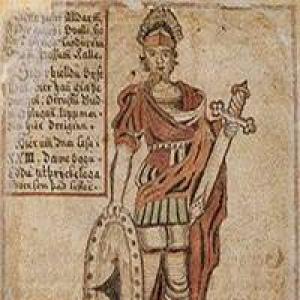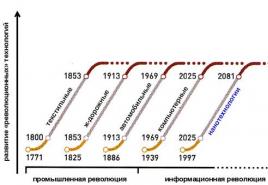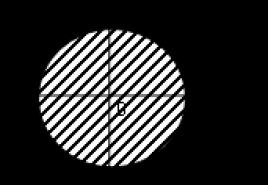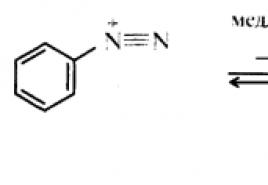What prevents a person from being a creative person. These Children: developmental psychology, development and education of children
Once again I want to introduce you to an interesting project “” and its author Sergei Marchenko.
I highly recommend getting acquainted with the publications of this resource, one of which I bring to your attention.
For self-realization a person needs to engage creativity- an activity in the process of which he uses personal capabilities to create something new, unique.
The purpose of creative activity is to use personal talent and imagination to solve problems, achieve goals and realize purpose. The result of the creative process is a new, unique element that improves its creator or the environment and provides new possibilities.
But in the process of creative activity, many obstacles constantly arise that a person must overcome.
What prevents us from achieving our goal?
Lack of self esteem
It manifests itself either in a lack of self-confidence and high self-criticism, or self-confidence or arrogance. This makes it difficult to take the first step to solve a problem and increases the risk of harm when implementing ideas. To overcome this obstacle you need to develop self-confidence.
Laziness and weak will
They also prevent you from starting the creative process and overcoming psychological inertia. To overcome them, you need to train self-discipline.
Rigidity
Firmness and steadfastness in the means used to make decisions and achieve goals. Limits a person from using new means that may be more effective and reliable. To overcome this obstacle, you need to develop imagination, flexibility of thinking, learn about the emergence of new means and apply them to solve problems and achieve goals.
Fear of failure, failure
This is a consequence of a lack of experience and the presence of uncertainty when providing impacts. Help or advice from a more experienced person, an expert who can give a correct assessment of the risks of the intended exposure, helps to overcome this obstacle.
Lack of organization
Having too many things to do and ideas makes it difficult to understand which ones are important and need to be addressed first. To overcome this obstacle, you need to organize personal goals and affairs into a single reliable system. Such an organization will allow you to free your memory and consciousness from constant, repetitive thinking about these matters, which complicates the process of generating new ideas.
Lack of prioritization
In the process of creative thinking, a large number of ideas are generated that need to be implemented. Some are very important and useful for solving the problem. They need to be implemented first. Others are less important and need to be put off until later, put in a queue. But most people don't define the importance of ideas - their priority. And they try to implement simpler, but less useful ideas. To overcome this obstacle, you need to learn to prioritize ideas.
Congestion of consciousness
After filling the mind with all possible knowledge that can help solve the problem, it needs to be allowed to rest and relax. But very often this is not done and consciousness begins to be used to solve other problems. Increased mental congestion reduces the rate of idea generation. To overcome this obstacle, you need to consciously take breaks to speed up the creative process.
Conformism
Accepting other people's opinions and experiences without criticism or analysis. This personality trait is characterized by agreement with everything that is in environment, without assessing whether it is correct or not, whether it is optimal or whether it can be improved. To overcome this obstacle, you need to develop critical thinking; you need to approach everything new with the questions “why, why, for what …”.
Impatience
A person wants to find a solution to a problem immediately. But this requires a large amount of source material (knowledge, ideas) and a high level of intellectual development. But when a solution is not found in a short period of time, then the person simply stops working on this problem and switches to another, easier one. To overcome this obstacle, you need to train self-discipline, and especially perseverance.
Removing all these obstacles is guaranteed to increase the efficiency and success of creative activity. This in turn will speed up the process of human self-realization.
What do you think about this?
Sincerely,
Evgeniy Mokhnachev
I repeat the link to Sergei Marchenko’s website
“Personal development - How to become successful and effective”
This entry was posted on 07/31/2012, 23:17 and is filed under . You can follow any responses to this entry through . Discussion is closed. Finally and irrevocably.
This is not discussed.
Creativity is the great gift of the Creator to man. Molded “in the image and likeness” of God, each of us is created to create. Each of us contains a number of unique talents.
Marina Trushnikova
Do you feel this power in yourself - the power of Creativity? Can you hear her call? Are you implementing it?
Yes, I know that “there are more important things in this life: work, children, health. But creativity... it’s not for everyone... it’s self-indulgence... where can I find time for it?..”
But I also know your nagging feeling in your chest - you want... You want to live in full force, fly on the wings of inspiration, draw, sing, write poetry! Isn't that right?
Sometimes, standing at the easel, I . I feel like the angels behind me are jealous of my ability to give physical embodiment to incorporeal images. They can't do that. I can . I can, like the Creator, create worlds. Create something that can be seen, touched, shared with other people.
This is a Gift that is given to us in this life. So why do we sometimes consciously refuse it?

I think it will not be a discovery for anyone to say that the creative channel is often for ourselves, that it is not yours, that you are not capable of it. You protected yourself from possible criticism by stopping creating.
It’s calmer this way. They block it in childhood. The teacher gave a bad mark for your masterpiece, your parents criticized your poems, your classmates laughed at your hairstyle - it doesn’t matter what the reason was.
You closed yourself off, you said, but the emptiness in your soul awakens and asks you to fill it. Getting older and wiser we return to creativity. With the embarrassment of a teenager, we try ourselves in what we wanted so much in childhood. And that's great! Go ahead, be brave! Remove restrictions that have become unnecessary!
Give yourself the opportunity to create, play,
like a child, soar on the wings of inspiration!
Soaring in this case is not a metaphor. It is a tangible state of mind. Most pleasant!
At the research meetings of the “Artists” group, we conducted immersions in the lives where we were artists, in those lives where creative qualities were manifested in high level. And you should see how a person glows with overwhelming happiness when he is in the energies of such an incarnation! This state is so resourceful, so joyful! All the blocks and complexes about yourself as creative person they just wash out.

And people start drawing and writing poetry. The creative flow just bursts through. Once you feel yourself in this flow, you want to enter it again and again.
Because... omnipotent, creative, to be equal to God in some way - isn’t this the best thing a person can feel?
Dear reader, how does your creativity manifest itself? Have you already felt this joy, this soaring, this delight? Did they create something without regard to “what people will say?”, “who needs it?”, “I can’t do it”? Did you catch yourself being childish and playing?
Will you be able to finish your life and say that you were happy on Earth, CREATING?..
Marina Trushnikova
1st year graduate
Institute of Reincarnation
Every person, in essence, is a creator. Look around, everything we see is created by human hands. People bring to life the most daring, fantastic ideas and invent something new every day. Even if you are not creative professionally, you still have a creative streak that helps you improve the world around you. The more creative you are in small things, the more likely it is that your talent will manifest itself in something big. Like any activity, the creative process has its ups and downs. But sometimes the ability to think creatively fades into the background and gets lost in the daily bustle. What hinders the development of our creative component?
Limiting yourself to generally accepted boundaries. There are always those who criticize your initiatives, ridicule your ideas and express distrust of your plans. Ignore their words and don’t try to convince them, you’ll just waste your time and energy. Trust your intuition, only it will lead you to the right path.
Reluctance to find out what impression your ideas make on others. Sometimes a person himself does not understand what discovery or work of art he has made. Creative ideas are tested many times before they leave their mark on the souls of humanity.
Active lifestyle without pauses and stops. Insights usually overtake us precisely when we step away a little from everyday problems and worries. The brain rests and we see the world around us from a slightly different point of view. To stimulate such states, switch from one type of activity to another more often.
Fear of failure. Any innovation and change always involves some risk. Because of the fear of failure, a great many ideas die at the very beginning of their inception. If you are confident in yourself and your passions, you will act decisively, recognizing that failure is only a test followed by a step forward.
The desire to do only what has already become habitual. Doing the same thing will give you the same results. In order to achieve new achievements and goals, you need to periodically go beyond your comfort zone and take on new, yet unknown tasks.
Lack of enthusiasm. The creative process cannot occur in the absence of passion for the work. Only curiosity and genuine interest drive thought processes and stimulate the development of new ideas.
Lack of awareness. The creative process requires a sufficient amount of knowledge on the current issue. Only by relying on knowledge, experience and logic can you analyze a problem and produce a creative result.
Scientists have proven that creative work useful for humans, but many people still don’t know, because we are all creative individuals by nature. Most believe that it does not belong to this category, but creativity manifests itself in absolutely any job, study or life, not only in what you are accustomed to consider creativity.
In the article you will learn which, psychologists will give advice on how to start and what prevents us from creating. After all, we are all creative individuals, but we simply have not revealed all our abilities and did not trust nature. When you begin to connect and feel nature, you will learn to create and create your life.
What is the benefit of creativity to a person - self-development
The main reason what stops us from creating?, this is a lack of confidence in yourself and your abilities. But you need to understand that there is a huge benefit from creativity - self-development and self-knowledge. After all, many people throughout their lives have not had time to reveal all their abilities and talents, which are inherent in everyone, in unlimited quantities. But due to false reasons and beliefs, most believe that they are not creative personalities.
In fact, everyone is already a creative person to a certain extent; it’s just that some develop their talent and improve creativity , while others find excuses and are afraid to start doing something new, even if they like it. Find out, because this is where the process of creation and training of creative abilities begins. Since there is not a single person in the world who cannot create, with a strong desire.
Criticism prevents us from creating
 The only thing that is more prevents us from creating this is the fear of criticism, which is why most people don’t know what benefits to humans from creativity, because we have never tried to start doing something creatively. Everyone is accustomed to standards and equality, but it is those who are not afraid to create and do something new who develop and become successful and happy people, to which those who obey afraid to create, dream and create ideas. Get rid of the fear of criticism and start doing what you love. Even if you can’t quit a job you don’t like because of money problems, you have free time that you can devote to doing what you love and developing your creative abilities.
The only thing that is more prevents us from creating this is the fear of criticism, which is why most people don’t know what benefits to humans from creativity, because we have never tried to start doing something creatively. Everyone is accustomed to standards and equality, but it is those who are not afraid to create and do something new who develop and become successful and happy people, to which those who obey afraid to create, dream and create ideas. Get rid of the fear of criticism and start doing what you love. Even if you can’t quit a job you don’t like because of money problems, you have free time that you can devote to doing what you love and developing your creative abilities.
The one who creates and creates becomes happier
Anyone who noticed creative personalities or read their biographies noticed that they worked constantly, day and night, seven days a week, and at the same time they became even happier and never got tired. This is only due to the fact that they found themselves and their meaning in life, their favorite job and trusted nature. Anyone who wants to understand what is the benefit of creativity to a person and what prevents us from creating, can start his new life path from searching for what you love and the meaning of life. Anyone who finds himself and does what he likes will become happier every day and enjoy his life much better than others who continue to be afraid to take the first step.
Instilled uncertainty and fear prevent us from creating
It doesn't matter where your insecurities or fears come from. prevents you from creating, in any case, if desired, everything can be changed. The most important thing to do is to find yourself in life, your favorite thing, what you are drawn to. Create a big dream and start moving towards it, then any fear and uncertainty will simply disappear from your life. When a person continues to blame his parents or others for the fact that he is not confident in himself, is afraid, and has no abilities, this means that his dream is still weak or does not exist at all.
 Don't waste your time, create a dream that will force you to take action every day and do something new by applying creativity. Find out, as we spend our whole lives on fear and excuses, without ever revealing our meaning in life and natural origin.
Don't waste your time, create a dream that will force you to take action every day and do something new by applying creativity. Find out, as we spend our whole lives on fear and excuses, without ever revealing our meaning in life and natural origin.
What are the manifestations of creativity?
Many have a stereotype that creativity manifests itself only in painting, music or poetry. But really benefits to humans from creativity, can bring more than just that. Creativity manifests itself in absolutely everything, in new approaches to doing familiar and standard work, to study and life. It’s just that if a person begins to do everything not according to standards, but in a new way, using his imagination and desire, these are creative abilities. All what stops us from creating?, since this is our incorrect knowledge about what creativity is and how it manifests itself. Remember, the one who comes out of the gray mass and begins to trust nature is already creative person.
How to develop creativity
In fact, it is not enough just to know what is the benefit of creativity to a person and what prevents us from creating, you need to start developing your creative talents. To do this, start creating for yourself new life. Start devoting 10-20 minutes every day to thinking about your dream and what nature and soul are leading you to. Don't be afraid, trust these feelings. Find a source of inspiration, it could be music, a loved one or work. Focus not on fear and standard logical thinking, but on feelings, emotions and desire. When you stop wishing for selfish goals, you will begin think creatively. To develop your creativity, start think differently than everyone else. Try not to copy what already exists, create something new and unknown, and then you will become not only a creative person, but will achieve happiness and success in life.
In addition to feelings that stimulate creative activity, there are feelings that inhibit creative efforts. Most dangerous enemy creativity? fear. It is especially evident in people with a rigid mindset of success. Fear of failure stifles imagination and initiative.
Another enemy of creativity? excessive self-criticism. Accurate measurements in this area are not yet possible, but there must be some “balance” between giftedness and self-criticism so that too picky self-esteem does not lead to creative paralysis.
The third enemy of creativity? laziness. However, such reasoning is also possible here. People strive to improve production in order to increase its productivity and reduce costs. Are they driven by the desire to achieve maximum benefits with minimal effort, in other words, to work less? get more. It turns out that laziness serves as a stimulus for all innovations that make work easier, and therefore is the “true mother of inventions,” as Norbert Wiener puts it.
Despite all the seduction of such reasoning, we still have to admit that laziness does not at all contribute to creative activity. Just as the natural enjoyment of food for a person can lead to gluttony and gluttony, just as the enjoyment of rest and peace can acquire a self-sufficient significance. The “feast of laziness” becomes a highly prized pleasure. Apparently, more than one talent was ruined by laziness.
· uncritical acceptance of someone else’s opinion (conformism, agreement)
· external and internal censorship
· rigidity (including the transfer of patterns, algorithms in solving problems)
desire to find an answer immediately
Dialogue of creative thinking
Understanding creativity means understanding the mind of the creator, but not describing (or prescribing) how to create. The most terrible thing is this creature, incapable of inventing, but knowing “how it’s done.” There is only one way to grasp the inner life of the inventor of ideas and poems - through the mental dialogue of the inner “I”.
The creative process includes psychological, emotional, uniquely personal, paradoxically random moments. But you still need to agree with the possibility of finding, albeit through logic internal dialogue in the head of the creator - to depict and understand creativity as a logical process. But how can we agree with this, because there is no logic in creativity (more precisely, creativity cannot be the subject of the science of logic). Thinking as creativity is artistic thinking, but it is radically illogical!
Thinking is always theorizing, and the essence of any creativity as thinking can only be understood based on the processes of theorizing. The initial setting of thinking (a situation when thinking is necessary, when sensation and representation cannot be done) is the need to reproduce in consciousness the possibility of an object, something that does not yet exist, is not given in sensations, but which can exist in some ideal, invented situations.
Thought arises when it is necessary to reproduce in consciousness (internally, for oneself) the possibility of an object in order to “understand” the object as it is, why it exists this way and not otherwise. It is this “in order to” that forces us to use the verb “to understand,” which cannot be replaced by any other verb, and forced us to define thinking through thinking (understanding). Understanding is the difference between thought and representation. The future possibilities of an object are quite possible to imagine, but turning them onto the object as it is, taking them as an “X-ray” of a present object is possible only by understanding, comprehending, possible only in concept. Separating the “essence of things” (their potential) from their existence means constructing in the mind an “idealized object” as a “means” to understand a real object that exists outside of our consciousness and activity. The eye loses focus; to see two objects at the same time? inside us and outside? impossible, we stop seeing and begin to understand. Such simultaneous existence of one? knowable, changeable? an object in two forms (in the form of an object of idealization and in the form of an idealized object) is the initial definition of thinking, which is rooted in the very “indivisible core” of human practical activity.
Primitive man began to think, painfully relating an “idealized object” (a supposed axe), still quite vague, indefinite, still identical to an idea, with a real, external object (a fragment of a stone), cross-checking these objects with each other. In the discrepancy between these two objects, in the gap between them, in the necessity and impossibility of their coincidence, the seed of thought is located, thinking grows. This is the original idea of theorizing.
In thinking, I fix, consolidate the subject of reflection as something existing outside of thought and clarified by it, as something that does not coincide with thought (the idealized object). Only then is it possible to constitute thought itself as something that does not coincide with real practical action, although it constitutes it? practical action is a necessary definition. But this is the initial assumption of the theory. “This is only in theory, not in reality”? such an accusation constitutes a negative definition of thinking. And at the same time a fundamental paradox of thought.
It is possible to feel, imagine, perceive something, but it is possible to think only about something. In sensations and ideas, I merge with the object of my sensation; I feel the blade of the knife as my pain. In thought I separate from the object of thought and do not coincide with it. But the whole point is that an object that does not coincide with thought is an object of reflection; it exists for thought only to the extent that it correlates with the mental object. And at the same time, he is something “unthinkable”, existing outside of thought (outside of me and independently of my consciousness), given to thought as a riddle and never completely assimilated by it. It is in thought that I am confronted with the existence of things in their “metaphysical” integrity, self-closure, and externality to the subject. But at the same time... The fairy tale about the white bull can continue indefinitely.
Of course, the logic of practice forms the rational basis of the paradox under consideration, but now we are talking about something else, since in thinking,? What is his “mission”? practice acts as a paradox, constantly being resolved, reproduced and deepening... One can even say that thought is practice in its paradoxicality.
Theoretical creativity is the invention of any ideas, any, the most grotesque idealized objects in order to understand the object as it is (or as if it were), outside of my practical activity and independently of it. The desire for the transpersonal, the superpersonal, this is the pathos of thinking. Only in detachment (theoretical in its potential) from oneself does it become possible to treat oneself as an “alter ego”, and the seed of internal dialogue arises. Poetry is radically non-dialogical, Bakhtin wrote about this very precisely. This is why the internal dialogue of thinking as creativity is only possible for the theoretical mind. It is no coincidence that as a subject logical research creative thinking should be taken as theoretical thinking, as the internal dialogue of a theorist. This should be the language (speech) of internal dialogue, in which there is a continuous interchange of texts, their polyphony, counterpoint, and not just coexistence.
Approaching his logic from the outside, the philosopher faces a paradox. The philosopher has to criticize his own logic (logic in general) in the name of some logic that does not yet exist, but is in a state of formation. Here the logic of creativity can only be understood as the creativity of logic... What remains in general from that iron logic, and why is this “dialogic” needed at all, this verification of “logic” by “logic”?
Isn’t this whirling of the squirrel of thinking in the wheel of “dialogue” simply an escape from life, from practice, from the old wisdom of Goethe - “theory, my friend, is brimstone, but the tree of life is ever green...”?
Only in communication between “I” and “YOU”, in the relationship “between” is something new born. In other words, the nature of creativity is dialogical and non-subjective. Personality is not the center and source of creative activity, since it expresses a pluralistic (rational and irrational, rational and emotional, etc.) existence. A personality is creatively active only in a dialogical relationship with the “Other”. The dialogical relationship is transformed into “WE” as a dual existence of “I” and “YOU”, directing its creative intentions to the separate “I” and “YOU”. “I” is not the source of creativity; it finds creativity in itself as the creative intention of “WE”. The productive ability of a dialogical situation, appearing in the subject-transsubject relationship “I” - “YOU” - “WE”, becomes a source of novelty for the individual. Otherwise, creativity can be defined as the implementation of the creative intention “WE” - reality in the personal reality of the subject







